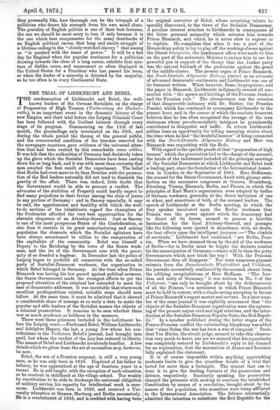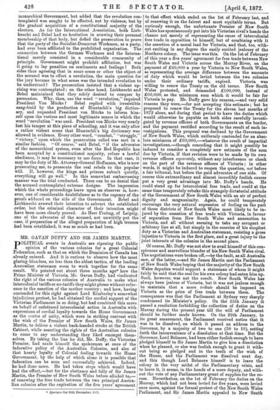THE TRIAL OF LIEBKNECHT AND BEBEL.
THE condemnation of Liebknecht and Bebel, the well- known leaders of the German Socialists, on the charge of Preparation of High Treason (Vorbereitung des Hochver- raths), is an important event in the domestic history of the new Empire, and their trial before the Leipzig Criminal Court has been followed with the liveliest interest through every stage of its progress. Commencing on the 1 1 th of last month, the proceedings only terminated on the 26th, and during the whole period the throng of the general public, and the overcrowded condition of the benches reserved for the newspaper reporters, gave evidence of the universal atten- tion that had been excited by this remarkable cause ciMbre. It was felt that the authorities of Germany had decisively taken tip the glove which the Socialist Democrats have been casting down for so long back, and it was with more than curiosity that men awaited the first result of the experiment. The belief that Berlin had even more to do than Dresden with the prosecu- tion of the Red leaders naturally did not tend to diminish the gravity of the affair. There was, indeed, little doubt that the Government wonld be able to procure a verdict. The advocates of the abolition of Property could hardly expect to find many prejudices in their favour among the class of jurors in any portion of Germany : and in Saxony especially, it may be said, the apprehension and hostility with which the well- to-do sections of the inhabitants regard the champions of the Proletariat afforded the very best opportunities for the alarmist eloquence of an Attorney-General. Juat as Saxony is one of the most prosperous States of the Confederation, so also does it contain in its great manufacturing and mining population the elements which the Socialist agitators have been always accustomed to utilize to the exasperation of the capitalists of the community. Bebel was himself a Deputy to the Reichstag by the votes of the Saxon work- men, and the ire of the Government rose with the proxi- mity of so dreaded a bugbear. In December last the police of Leipzig began to prohibit all connection with the so-called party of Socialist-Democrat workmen, the organization to which Bebel belonged in Germany. At the time- when Prince Bismarck was having his law passed against political sermons, the Saxon Government made the strongest efforts to get the proposed alteration of the criminal law extended to meet the case of democratic addresses. It was inevitable that where such excellent predispositions existed, suitable steps should soon follow. At the same time, it must be admitted that it showed a considerable share of courage at so early a date to make the popular and able leaders of the Socialist masses the objects of a criminal prosecution. It remains to be seen whether there was as much prudence as boldness in the measure.
There were three prisoners included in the indictment be- fore the Leipzig court,—Ferdinand Bebel, William Liebknecht, and Adolphus Hepner, the last, a young Jew whom his con- tributions to the Volkstaat, Bebel's journal, had brought into peril, but whom the verdict of the jury has restored to liberty. The names of Bebel and Liebknecht are already familiar. A few details which we glean from the act of accusation may, however, be new.
Bebel, the son of a Prussian sergeant, is still a very young man, as he was only born in 1840. Deprived of his father in infancy, he was apprenticed at the age of fourteen years to a turner. He is self-taught, with the exception of such education as he received in childhood at the village school. Too weakly by constitution to be able to discharge the universal obligation of military service, his capacity for intellectual work is enor- mous. Liebknecht was born in 1826, and received a Uni- versity education at Giessen, Marburg, and Berlin successively. He is a revolutionist of 1848, and is credited with having been
the original converter of Bebel, whose surprising talents he speedily discovered, to the views of the Socialist Democracy. A peculiar interest attaches to Liebknecht in consequence of the bitter personal animosity which actuates him towards Prince Bismarck, and which he is never slow to express or to explain. He complains that when it was a part of the Bismarckian policy to try to play off the working-classes against the liberal bourgeoisie, the handsomest offers were made to him on the part of the autocratic Minister to induce him to use his powerful pen in support of the theory that the Junker party was the natural bulwark of the proletariat against the greed of the middle-classes. The present organ of Prince Bismarck, the Nord-Deutsche Allgemeine Zeitung, started as an advocate of advanced democratic sentiments, and Liebknecht was one of its foremost writers. When however, Brass, its proprietor, sold the paper to Bismarck, Liebknecht indignantly severed all con- nection with "the agents and hirelings of the Prussian Junkers and the Prussian rule." The circumstance was the occasion of that disagreeable intimacy with Dr. Stieber, the Prussian Fouche, which has continued to accompany Liebknecht to the present hour, and in the course of which the resolute democrat believes that he has often recognised the revenge of the iron statesman whose pseudo-socialistic intrigues he prominently contributed to disappoint and baffle. In return Liebknecht seldom loses an opportunity for telling annoying stories about the time when he had "the doubtful honour" of being connected with the Nord-Deutsche Allgemeine Zeitung and Herr you Bismarck was coquetting with the Reds.
With regard to the specific proofs of that "preparation of high treason" which the prosecution laid to the charge of the accused, the heads of the indictment included all the principal meetings of the Socialist Democrats at which Liebknecht and Bebel took. a leading part, since the foundation of the International Associ- tion in London in the September of 1864. Herr Hoffmann, the counsel for the Saxon Government, dwelt with gloomy satis- faction on the successive congresses at Geneva, Neuenburg, Nurnberg, Vienna, Eisenach, Berlin, and Plauen, in which the principles of Karl ltarx's organization were adopted by bodies of German workmen, generally at the direct invitation of one or other, and sometimes of both, of the accused leaders. The speech of Liebknecht at the Berlin meeting, in which the fiery speaker inculcated upon the Berlin workmen that Prussia was the power against which the democracy had to direct all its forces, seemed to possess a horrible fascination for the loyal Attorney-General, and passages like the following were quoted in abundance, with, no doubt, the best effects upon the intelligent jurymen :—" The citadels of servitude," Liebknecht had exclaimed, "are Berlin, Prus- sia. When we have stormed them by the aid of the workmen of Berlin—for in Berlin must be fought the decisive combat for the emancipation of Germany—where will be then the petty Governments which now block the way ? With the Prussian Government they all disappear." Nor were numerous piquant extracts from -the Demokratische Tfrochenblatt and Volkstaat, the journals successively conducted by the accused, absent from the edifying recapitulations of Herr Hoffman. "The free- dom and unity of Germany," it was written in No. 9 of the Volkstaat, "can only be brought about by the dethronement of all the Princes,"—a sentiment in which Prince Bismarck must be held to concur, with a single saving exception in favour of Prince Bismarck's august master and servant. In a later num- ber of the same journal it was explicitly announced that "the objects of the Socialist-Democrat organization were the upturn- ing of the present unjust civil and legal relations, and the intro- duction of the Socialist-Democrat Popular State, the Red Repub- lic." In a number published during the latter stages of the
Franco-Prussian conflict the culminating blasphemy was added that "since Sedan the war has been a war of conquest." Presi- dent Von Miicke, the circuit judge, seemed to take this observa- tion very much to heart, nor are we assured that his equanimity was completely restored by Liebknecht's reply to his demand for an explanation, that the annexation of Alsace and Lorraine fully explained the statement.
It is of course impossible within anything approaching moderate limits to give the cbuntless details of a trial that
lasted for more than a fortnight. The utmost that can be
done is to give the leading features of the prosecution and defence, respectively. Succinctly speaking, the prosecution charged the prisoners with seeking to overturn the established Constitution by means of a revolution, brought about by the masses of the population, who meantime were being affiliated
to the International Association. The defence substantially admitted the intention to substitute the Red Republic for the
monarchical Government, but added that the revolution con- templated was sought to be effected, not by violence, but by the gradual acquisition of a constitutional majority of the electors. As for the International Association, both Lieb- knecht and Debel had no hesitation in avowing their personal membership of that body, but defied the prosecution to prove that the party of the Socialist-Democrat Workmen, as a party, had ever been affiliated to the prohibited organization. The connection between the German Workmen and the Interna- tional merely consisted in a considerable community of principle. Government might prohibit affiliation, but was it going to lay penalties on sentiments and feelings ? Both sides thus agreeing that in some sense or other the object of the accused was to effect a revolution, the main question for the jury became in what sense was the intended revolution to be understood ? The prosecution insisted that a violent up- rising was contemplated ; on the other hand, Liebknecht and Bebel maintained that they solely desired to conquer by persuasion. Why, then, use the word "revolution," inquired
President Von Miicke ? Bebel replied with irresistible sang-froid by the production of Bluntschli's big diction- ary, and requested President von Miicke to inform him- self upon the various and most legitimate senses in which the word "revolution" was used. President von Mticke very nearly lost his temper at this piece of schooling, and it was only after a rather violent scene that Bluntschli's big dictionary was allowed in evidence. Every other word, "combat," "struggle," "victory," upon which the prosecution relied was met in a similar fashion. "Of course," said Bebel, "if the advocates of the monarchical system, even after the Red Republic has been accepted by a constitutional majority, refuse a lawful obedience, it may be necessary to use force. In that case, it may be the duty of Mr. Attorney-General Hoffmann, who is now prosecuting me, to prosecute the real rebels to the popular will. If, however, the kings and princes submit quietly, everything will go well." In this somewhat embarrassing manner was the trial conducted. There can be no denial that the accused contemplated extreme designs. The impression which the whole proceedings leave upon an observer is, how- ever, one of considerable doubtfulness as to the cogency of the proofs adduced on the side of the Government. Bebel and Liebknecht avowed their intention to subvert the established -order, but the criminal character of their intention might have been more clearly proved. As Herr Freitag, of Leipzig, one of the advocates of the accused, not unwittily put the .case, if preparation of the alleged preparation of high treason had been established, it was as much as had been.



































 Previous page
Previous page